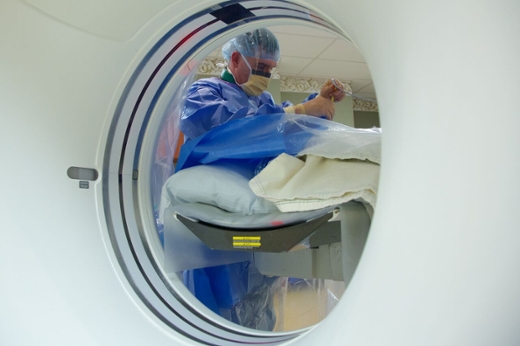A new study is underway at two Emory University hospitals to examine the effectiveness of cryoablation on breast cancer patients who suffer from post-mastectomy chronic pain syndrome. The prospective two-year study, by the Glenn Family Breast Center at Winship Cancer Institute of Emory University, will enroll 22 patients primarily at Emory University Hospital Midtown and Emory Johns Creek Hospital.
Cryoablation is a process that uses extreme cold (cryo) to destroy or damage tissue (ablation). The study, called “Percutaneous Image Guided Cryoablation of the Intercostobrachial Nerve for Management of Post Mastectomy Pain Syndrome,” will assess the efficacy and safety of cryoablation therapy for the treatment of post-mastectomy pain syndrome.
Symptoms of post-mastectomy chronic pain syndrome include pain and tingling in the chest wall, armpit and/or arm. According to the International Association for the Study of Pain, post-mastectomy pain syndrome affects 30 percent to 80 percent of women who undergo breast surgery.
“Participants will be randomized to receive cryoablation or a therapeutic peripheral nerve block injection,” says J. David Prologo, MD, FSIR, director of Interventional Radiology Services at Emory Johns Creek Hospital, and assistant professor in the Department of Radiology and Imaging Sciences in Emory's School of Medicine.
“We will evaluate patients at baseline and after treatment at 10 days, 90 days and 180 days during clinical visits,” says Prologo.
The study examines ratings of perceived pain intensity recorded by a Visual Analog Scale (VAS) ranging from “no pain” to “worst possible pain.”
“Some patients may have experienced trauma to the intercostobrachial nerve during surgery, formed scar tissue or neuroma causing them persistent pain,” says Janice Newsome, MD, associate director for the Division of Interventional Radiology at Emory University Hospital Midtown and assistant professor in Emory’s School of Medicine.
“We use a CT scan to help guide the needle during cryoablation to accurately target the problem area,” says Newsome. “Then, we freeze the nerve for over five minutes, unthaw and freeze again.”
The outpatient cryoablation procedure takes about an hour.
For more information about this clinical trial, contact the study coordinator, Maria Rivas at 404-712-7962 or Jacqueline Knight at 404-520-3233.

